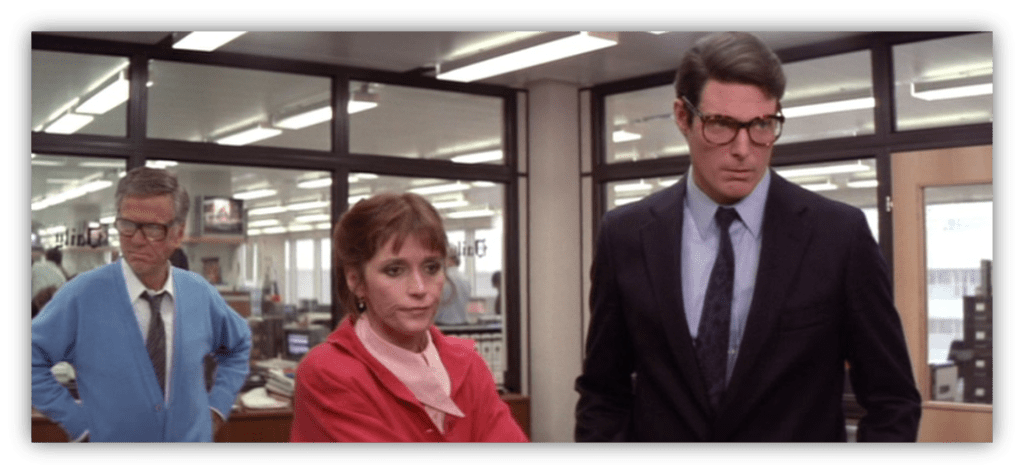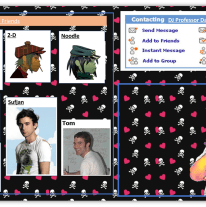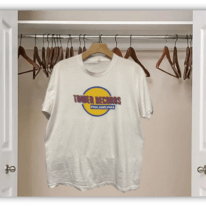“Call the Daily Planet.”
– A famous talk show host
Early April. A Tuesday, the year was 1986. Life imitated art.
Were you one of those night owls up at midnight? Did you know that America caught up to Paddy Chayefsky’s future?
Of course not. Hindsight is a bomb with a long fuse. A remote. A bit.
A historic building.

A flashpoint.

The late night talk show host held a microphone in one hand and a fruit basket in the other.
His network was being bought out; the deal wouldn’t be finalized until December.
But for all intents and purposes, the late night talk show host was dropping by unannounced for a meet and greet with his new overlords.
America laughed along with the hijinks of our counter-cultural hero when the head of security had second thoughts about the standard niceties:
And withdrew his handshake at the last second.

Some people will never hear the bomb go off. The fuse is endless.
We live with iterations of the “corporate handshake” every day. There were other remotes, New Yorkers the audience came to know and love.
For instance, that nice doorman who let the late night talk show and his crew occupy the inner sanctum of commerce for a brief spell.

Was he fired?
We met small business owners, pedestrians, surprised homeowners and renters, and sometimes, dogs, over the show’s four year-run. The late night talk show host was just being a goofball. Surely, people in power at the end of the day were just like us, they put their Pants on one leg at a time.
We were naive. The head of security had no patience for shenanigans. We were uninvited guests.

The fruit basket never made it to the CEO. Americans came face to face with the “forces of nature”.
There was no seat for us in the corporate meeting room. We were riff-raff.
Paddy Chayefsky would’ve been sixty-three when the late night talk show host and his crew were escorted out of the building.
Peter Finch, a decade earlier, had died from heart failure while NETWORK was in the midst of its original theatrical run. He would win Best Actor posthumously for his role as Howard Beale at the 49th Academy Awards.

Titans of seventies cinema, both.
Yet they never got to see the late night talk show host fight authority from his bully pulpit, not unlike the “Mad Prophet of the Airwaves” lamenting about UBS’ independence getting hijacked by a conglomerate.
Whereas the host of The Howard Beale Show rouses his assembly into chanting:
“We’re mad as hell, and we’re not going to take it anymore!”

…In tribal unison like automatons who know the music but not the words.
The late night talk show host’s audience, perhaps, couldn’t quite put their finger on why the network suits were pinheads.
They laughed and clapped because the “applause” sign instructed them to clap. The late night talk show host, however, undoubtedly, knew which cobbler from whose shoes he was filling:
Paddy Chayefsky:

The NYC-born playwright, among many things in his capacity as the screenwriter for NETWORK, directed by Sidney Lumet:
This celebrated oracle anticipated the rise of the multinational as an all-encompassing monolith in people’s lives.
The corporate brass could withstand being ridiculed with derogatory names, questioned about their motivations.
And especially: criticized for selling appliances of shoddy quality to the American consumer.

People still bought their toasters. The pinheads played the long game. They were holding all the cards. And eventually, the pinheads would get their revenge.
The late night talk show host, long thought to be the heir apparent to the throne, was passed over when the king called it quits in 1993.

Crestfallen and humiliated, he left the network for a competitor when his contract ran its course.
In retrospect, this gladiator match between David and Goliath, especially the infamous live remote, can be seen as the inspiration for two movies:
Released five months apart in 1987, they anticipated the danger of mergers an acquisitions. And in particular, the effect it would have on the news profession.
“If you think I’m gonna let you turn this grand old lady into one of your bimbos…”
-Perry White
The Daily Planet is under new ownership.
Its longtime editor-in-chief (played by Jackie Cooper) can’t reign in his strong feelings of antipathy towards spectacle over substance, tabloid journalism over hard news, and overall bad taste:
When Lacy Warfield (Mariel Hemingway), the daughter of a business magnate, holds up a naked woman competing with the story about escalating nuclear tensions between countries, donning its front page.

SUPERMAN IV: THE QUEST FOR PEACE, directed by Sidney Furie, in spite of being plagued by:
- Rote acting
- Seemingly unfinished special effects
- Brecht-like creative geography
- And a shortened running time after disastrous test screenings set forth a studio-mandated bowdlerization:
It still has two things going for it:

- Christopher Reeve’s final appearance in a red cape.
- And a subplot that frames the schlock with accidental historicity.
The poorly-reviewed and low-grossing film, in retrospect, seems fresher, redeemable, and arguably, important, because of its timely subject matter hiding in plain sight.
Super-men like David Warfield (Sam Wanamaker):

Media moguls who prioritize monetization over civic duty is brought into sharp focus for the first time, albeit like an extra with a speaking part that upstages the main cast.
Seasoned reporters such as Clark Kent (Christopher Reeve) and Lois Lane (Margot Kidder) capitulate rather than raise hell against the changes their new boss proposes to boost circulation numbers.
Lois, who commandeered the city desk in SUPERMAN: THE MOVIE, directed by Richard Donner, would be reprimanded editorially for “pushing a load of rinky-dink garbage” in her former life as an ambulance chaser.
Lois’ professional life changes after her exclusive interview with Superman.
The Daily Planet sends their hot reporter to the west coast, where she survives a manmade earthquake while on assignment about exorbitant prices being offered by an unknown buyer for seemingly worthless land.

In other words, Lois Lane becomes an investigative reporter.
She could’ve died again, this time overseas, covering terrorists at the Eiffel Tower in SUPERMAN II, directed by Richard Lester.
When her second Paris assignment gets cancelled, the writer folds, showing the bean-counters masquerading as newspaper men how hair falls when your forehead meets the desk.

It’s a pathetic display.
This can’t be the same fiery woman who saw Paris from the bottom of a rising, then falling elevator filled with suicide bombers at breakneck speed.
The audience wants Lois to rise up from her chair and get angry.

But SUPERMAN IV: THE QUEST FOR PEACE was never intended to be NETWORK. It can only be a naive one.
As the editor-in-chief?

Jackie Cooper has only a couple of lines.
Clark Kent, a reporter, gets sidelined, agreeing instead to Lucy’s idea that he become the lifestyle columnist: “Metropolis After Dark”, and to boot, risks creating a toxic office environment by seeing the boss’ daughter outside of work. The Daily Planet lacks an advocate for hard news.
That film would come soon enough…
…to be continued…






Thoughts
I think Network was ahead of the curve on a lot of things.
Superman IV sounds perfectly awful. Glad I stopped watching after II.
Were the two souvenir clerks, Mujibur and Sirajil a part of that era of Letterman or where they later?
They were later, after Letterman moved to the Ed Sullivan Theater for CBS. That’s when Rupert at the Hello Deli became a regular, too.
Thank you for the clarification.
I’ve never seen Network (shame on me) or the Superman movies (not so much) but this is an interesting take. Looking forward to Part 2!
I’ve never seen Network but I’ve seen all the Superman movies (the Christopher Reeve iteration, none of the 21st century versions) so I think that’s probably even bigger shame on me.
Superman IV was showing at our local 2 screen cinema at the same time as Mannequin. My dad took me to Superman, while mum took sister to Mannequin. No idea who got the better deal.
I was 11 and haven’t watched Superman IV since so the nuances of media going off the rails eluded me. An interesting read as always though.
Oof, Mannequin
Ooh, bucket list. I’ve never seen Mannequin. I was in my Roger Ebert and Gene Siskel phase of my movie-watching when it came out. I need to check that one out. If only to support the critically-maligned Diane Warren.
(Not to slight the late Roger Ebert. I went to Borders and got my 1999 version of his movie guide autographed. I also have a picture of the back of his head at the HIFF premiere film, South Korea’s Y.M.C.A. Baseball Team in a Waikiki theater. All of us Ebert fans used to post on his blog, hoping that he’d answer you. He once told me to read Willa Cather’s My Antonia. I was writing about my academic advisor and how she assigned us Iris Murdoch’s Under the Net in my first literature course. The post was mainly about previously associating female writing with Danielle Steele.)
I’ve never been to Kansas. But my uncle’s first wife was from Kansas. There is a brief Smallville scene in Superman IV: The Quest for Peace. I could tell that wasn’t Kansas. The movie, as you know, was shot on location in the UK, or on a UK soundstage.
I am constantly amazed at what I see after not watching a film since its original showing. Mannequin is going to tell me something profound about life that was never the filmmaker’s original intention.
Yes, I would imagine both Siskel and Ebert were thumbs way down on Mannequin. I actually did watch it. I won’t comment further.
My Antonia is a great book, one of my favorites from my college courses. Still on my shelf right next to me. Did you ever read it?
I miss Siskel and Ebert.
Superman 2 is regarded as one of best superhero movies. It’s really good.
That ‘Tiffany Network’ graphic is well-timed.
I so remember that withdrawn handshake to Letterman in 1986. Dave would show that would-be-handshake in slow motion for days after that.